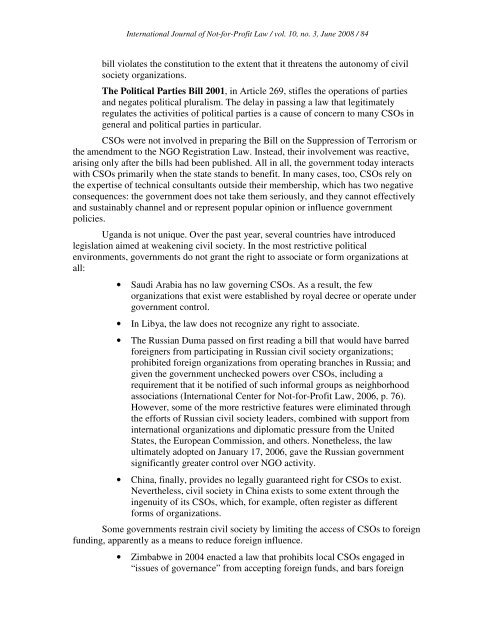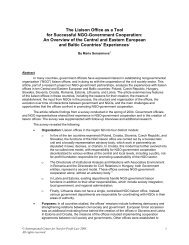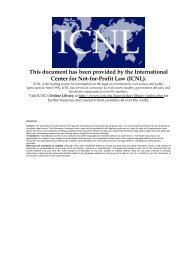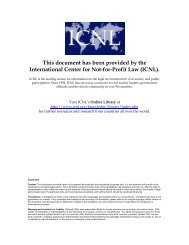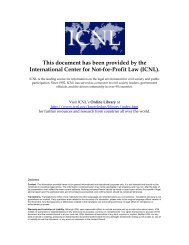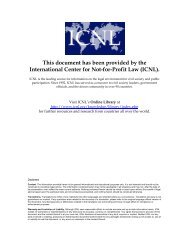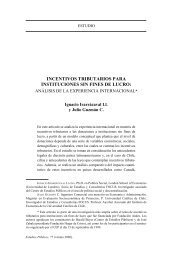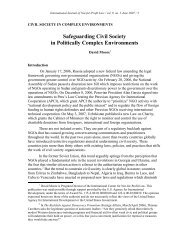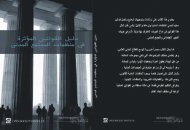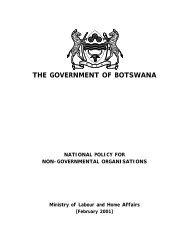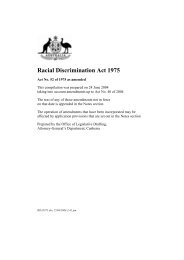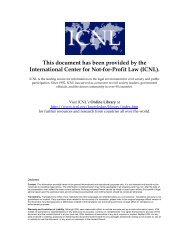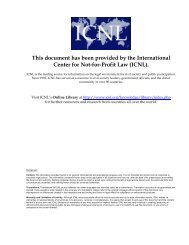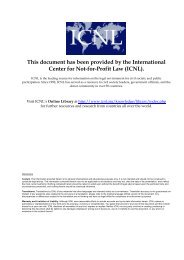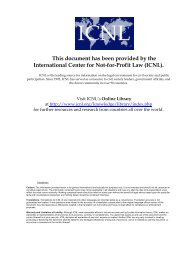Rising from the Ashes: The Rebirth of Civil Society in an ...
Rising from the Ashes: The Rebirth of Civil Society in an ...
Rising from the Ashes: The Rebirth of Civil Society in an ...
Create successful ePaper yourself
Turn your PDF publications into a flip-book with our unique Google optimized e-Paper software.
International Journal <strong>of</strong> Not-for-Pr<strong>of</strong>it Law / vol. 10, no. 3, June 2008 / 84<br />
bill violates <strong>the</strong> constitution to <strong>the</strong> extent that it threatens <strong>the</strong> autonomy <strong>of</strong> civil<br />
society org<strong>an</strong>izations.<br />
<strong>The</strong> Political Parties Bill 2001, <strong>in</strong> Article 269, stifles <strong>the</strong> operations <strong>of</strong> parties<br />
<strong>an</strong>d negates political pluralism. <strong>The</strong> delay <strong>in</strong> pass<strong>in</strong>g a law that legitimately<br />
regulates <strong>the</strong> activities <strong>of</strong> political parties is a cause <strong>of</strong> concern to m<strong>an</strong>y CSOs <strong>in</strong><br />
general <strong>an</strong>d political parties <strong>in</strong> particular.<br />
CSOs were not <strong>in</strong>volved <strong>in</strong> prepar<strong>in</strong>g <strong>the</strong> Bill on <strong>the</strong> Suppression <strong>of</strong> Terrorism or<br />
<strong>the</strong> amendment to <strong>the</strong> NGO Registration Law. Instead, <strong>the</strong>ir <strong>in</strong>volvement was reactive,<br />
aris<strong>in</strong>g only after <strong>the</strong> bills had been published. All <strong>in</strong> all, <strong>the</strong> government today <strong>in</strong>teracts<br />
with CSOs primarily when <strong>the</strong> state st<strong>an</strong>ds to benefit. In m<strong>an</strong>y cases, too, CSOs rely on<br />
<strong>the</strong> expertise <strong>of</strong> technical consult<strong>an</strong>ts outside <strong>the</strong>ir membership, which has two negative<br />
consequences: <strong>the</strong> government does not take <strong>the</strong>m seriously, <strong>an</strong>d <strong>the</strong>y c<strong>an</strong>not effectively<br />
<strong>an</strong>d susta<strong>in</strong>ably ch<strong>an</strong>nel <strong>an</strong>d or represent popular op<strong>in</strong>ion or <strong>in</strong>fluence government<br />
policies.<br />
Ug<strong>an</strong>da is not unique. Over <strong>the</strong> past year, several countries have <strong>in</strong>troduced<br />
legislation aimed at weaken<strong>in</strong>g civil society. In <strong>the</strong> most restrictive political<br />
environments, governments do not gr<strong>an</strong>t <strong>the</strong> right to associate or form org<strong>an</strong>izations at<br />
all:<br />
• Saudi Arabia has no law govern<strong>in</strong>g CSOs. As a result, <strong>the</strong> few<br />
org<strong>an</strong>izations that exist were established by royal decree or operate under<br />
government control.<br />
• In Libya, <strong>the</strong> law does not recognize <strong>an</strong>y right to associate.<br />
• <strong>The</strong> Russi<strong>an</strong> Duma passed on first read<strong>in</strong>g a bill that would have barred<br />
foreigners <strong>from</strong> participat<strong>in</strong>g <strong>in</strong> Russi<strong>an</strong> civil society org<strong>an</strong>izations;<br />
prohibited foreign org<strong>an</strong>izations <strong>from</strong> operat<strong>in</strong>g br<strong>an</strong>ches <strong>in</strong> Russia; <strong>an</strong>d<br />
given <strong>the</strong> government unchecked powers over CSOs, <strong>in</strong>clud<strong>in</strong>g a<br />
requirement that it be notified <strong>of</strong> such <strong>in</strong>formal groups as neighborhood<br />
associations (International Center for Not-for-Pr<strong>of</strong>it Law, 2006, p. 76).<br />
However, some <strong>of</strong> <strong>the</strong> more restrictive features were elim<strong>in</strong>ated through<br />
<strong>the</strong> efforts <strong>of</strong> Russi<strong>an</strong> civil society leaders, comb<strong>in</strong>ed with support <strong>from</strong><br />
<strong>in</strong>ternational org<strong>an</strong>izations <strong>an</strong>d diplomatic pressure <strong>from</strong> <strong>the</strong> United<br />
States, <strong>the</strong> Europe<strong>an</strong> Commission, <strong>an</strong>d o<strong>the</strong>rs. None<strong>the</strong>less, <strong>the</strong> law<br />
ultimately adopted on J<strong>an</strong>uary 17, 2006, gave <strong>the</strong> Russi<strong>an</strong> government<br />
signific<strong>an</strong>tly greater control over NGO activity.<br />
• Ch<strong>in</strong>a, f<strong>in</strong>ally, provides no legally guar<strong>an</strong>teed right for CSOs to exist.<br />
Never<strong>the</strong>less, civil society <strong>in</strong> Ch<strong>in</strong>a exists to some extent through <strong>the</strong><br />
<strong>in</strong>genuity <strong>of</strong> its CSOs, which, for example, <strong>of</strong>ten register as different<br />
forms <strong>of</strong> org<strong>an</strong>izations.<br />
Some governments restra<strong>in</strong> civil society by limit<strong>in</strong>g <strong>the</strong> access <strong>of</strong> CSOs to foreign<br />
fund<strong>in</strong>g, apparently as a me<strong>an</strong>s to reduce foreign <strong>in</strong>fluence.<br />
• Zimbabwe <strong>in</strong> 2004 enacted a law that prohibits local CSOs engaged <strong>in</strong><br />
“issues <strong>of</strong> govern<strong>an</strong>ce” <strong>from</strong> accept<strong>in</strong>g foreign funds, <strong>an</strong>d bars foreign


